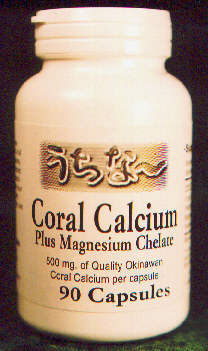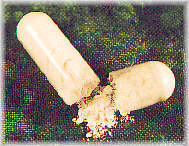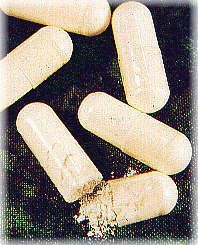

here are entire books written on the
value of
coral calcium -- something of
a marketing 'buzz word' for
fossilized stony coral --
which contains well over 70 'marine coral minerals'
-- of which over 40 of these minerals are known to be
essential to human nutrition. (Many agree, however,
that it is stony coral's two primary elemental
components, calcium and magnesium, in which most
people are at least mildly deficient, that provide
the greatest benefit. We add additional magnesium
chelate to provide a calcium-to-magnesium ratio that
is optimal for human ingestion.)

There are a host
of coral products on the market now, so we wanted to be
careful in our sourcing decisions. We chose
Okinawan stony coral for a variety reasons
(which are actually "mined" from the Rukuyuku Islands
of Okinawa - where the fossilized stony coral sits
in the same pure, pollution-free state in which
remained for thousands of years).
First, fossilized Okinawan stony coral minerals
come from a pure, single uncontaminated source ---
invertebrates and their limestone casing.
Moreover, the source material is not harvested from
polluted sea water. It was derived from the land
where the sea used to be, well over 2,000 years old.
Okinawa is over 1,000 miles away from where
atomic radiation contamination took place on
other Pacific islands (largely through nuclear
weapons' testing).

According to
medical researcher, Dr. James Chappell
(author of
The Miracle Elements: Fossilized Stony Coral Minerals),
"Stony corals are sea animals, which includes the hydroids,
jellyfish and sea anemones. By secreting a highly
mineralized limestone, the stony corals build a housing
of protective cups into which the soft polyp animals
can retreat when disturbed. The limestone housing is made
of all the minerals available in the ocean." These
minerals amount to over 70 different minerals, many
of them rare trace minerals used by the body, plus
"antibiotic, anti-viral, and anticancer substances
in some of the different corals."

Bioavailability
and acceptance by the body is an important issue
when dealing with mineral supplementation.
Dr. Chappell goes on to note: "Fossilized stony
coral minerals are so easily accepted by our body
that surgeons can use pieces of coral in bone
transplants without rejection. It is almost
impossible to overdose... and there are no known
side effects."

Health Claims:
Separating Fact From Fiction

Several prominent
physicians, including
Dr. Stephen Holt (M.D.) have written
monographs on the confirmed health benefits of 'coral calcium'.
Even so, given the hype that is currently
being generated in the U.S. (particularly within
infomercials where it is touted as a cure for cancer,
heart disease, AIDS, diabetes, etc.) should be viewed with some
skepticism. On the one extreme, you have
Robert R. "Bob" Barefoot,
whose informercials in the U.S. paint a picture of coral
calcium (specifically,
HIS coral calcium) as a
cure-all. (This kind of overreaching eventually
caught the
attention
of the FTC, FDA, and U.S. Postal Inspector in the U.S.
which filed lawsuits in June, 2003).
On the other extreme, you have
Dr. Bruce Halstead (M.D.), who has been decidedly
more conservative, though still quite positive,
in his assessment of coral's health-giving properties.
 "I believe that
coral calcium is neither a medical panacea nor a scam.
Coral calcium is a valuable, holistic, mineral,
dietary supplement which poses many important issues,
ranging from discussion about our current mineral-depleted
Western diet to concerns about the ecology and future
of coral reefs.... (also) I find no credible evidence
whatsoever that one form of high quality coral (collected
above or below sea-level) is superior or inferior
to other forms, despite unsubstantiated claims to
the contrary."
 Dr. Stephen Holt, M.D. Dr. Stephen Holt, M.D.
|

The foundation for
health claims gets its initial impetus from Okinawan culture
itself --- Okinawans are strong believers in the health
benefits of taking coral. (A common method of use is
the use of stony coral in teas.) We also believe, as
do the Okinawans, that there is a benefit to using
only above sea-level product. Dr. Halstead himself
believes that the potential risk of modern
marine pollutants, such as plutonium, in below
sea-level coral, make it a less desireable choice.


One of the common
health claims concerning coral calcium is that it
bestows longevity -- wherein the longer lifespans
of Okinawans as compared to their mainland Japanese
cousins (as well as Chinese or Koreans) is the
result of coral consumption. Although quite possible,
Dr. Holt points out that Okinawan lifestyle and
diet differs substantially from other populations.
The argument that other populations with long
average lifespans (i.e. people of Hunza, Vilcabamba, etc.)
also have mineral-rich diets provides gist for
further investigation, but without factoring in
unique lifestyle and dietary aspects of these
groups as well, such speculation is not positive
proof.

Nonetheless, taking
into account modern farming methods and Western diets,
which, relative to the diet of our ancestors living
just a century ago, are mineral deficient, we feel
there is no doubt that "coral calcium" may be one
of the most important supplemental additions you
make to your diet --- anywhere.
Serving Size: 3 Caps (650 mg x 3), or 1,950 mg.
Servings Per Container: 30
Amount Per Serving ------------- % Daily Value **
Coral Calcium .......... 1500 mg*
Yielding Calcium ... 360 mg (36%)
Magnesium Chelate .. 300 mg (60%)
Vitamin D .......... 800IU (200%)
With over 72 other trace minerals.
** % Daily Values are based on a 2,000
calorie
diet for adults and children over 12.
* Daily Value not established.



 Supplement Facts
Supplement Facts 